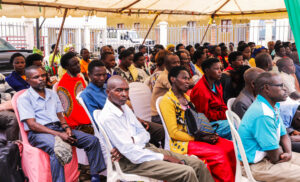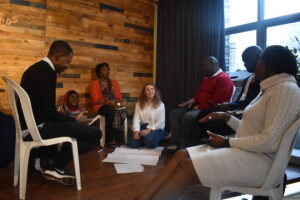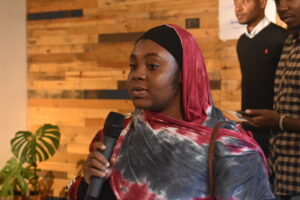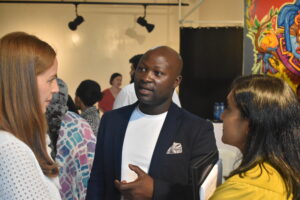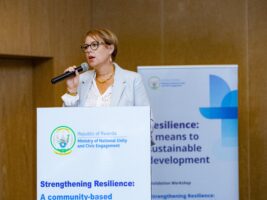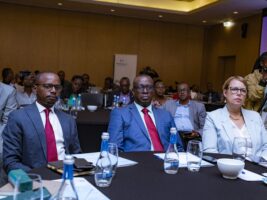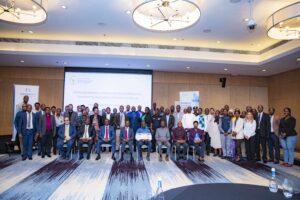Facilitating young people’s meaningful participation in peacebuilding initiatives should be a cornerstone of any effort to foster a peaceful and cohesive society. This resonates particularly well in Rwanda, where more than 70% of the population is youth, with a large proportion born after the Genocide against the Tutsi that took place three decades ago.
The Genocide tore Rwanda’s social fabric apart. A significant number of young people were manipulated and involved in the killings. To build lasting peace and consolidate the reconciliation and social cohesion gains that have been achieved, youth must be involved in the process.
On June 1, 2024, the Rotary Club Kigali Seniors (RCKS) partnered with Interpeace to organise a one-day retreat to further engage young Rwandans in peacebuilding and social cohesion. Themed “Consolidating Peace and Social Cohesion in Rwanda,” the event brought together more than 50 young people, members of Rotaract clubs (youth-led Rotary clubs), and elders.
It served as an intergenerational dialogue, enabling youth to understand their country's tragic past, which led to genocide, and to chart ways to build a peaceful and resilient Rwanda in the future. The participants were university students and young professionals from across the country. Their elders were prominent individuals from various backgrounds, including the public and private sectors, academia, and civil society organisations.
“This country was destroyed by ethnic divisionism 30 years ago. We have come far to rebuild it. It’s your time to understand where we came from and commit to never letting it happen again. You must build a better society than Rwanda is now,” underlined Dr. Jean Pierre Dusingizemungu, a university lecturer, as he delved into Rwanda's history of past violence, the path to reconciliation, and reconstruction. He stimulated participants to reflect on the adverse consequences of Rwanda's history of conflicts and genocide and to forge a common identity to foster unity and social cohesion in their respective communities.
Nathalie Siborurema, one of the participants, said, “This kind of dialogue is very important and necessary as it enables us to learn from experienced people who lived through the situation we hear about. It arms and prepares us to build a future peaceful and cohesive Rwandan society. I feel ready to take up the challenge with enthusiasm.”
Dr. Jean Bosco Kabera, a prominent member of RCKS who coordinated this activity, underscored the importance of educating young people to promote social cohesion. “I think it’s critical for Rwanda to ensure that youth not only understand the past but also take a leading role in defining our future,” he said, adding that the partnership with Interpeace to organise this retreat was enriching as young people are among the targets of its holistic peacebuilding programme in Rwanda that seeks to address mental healing, promote social cohesion, and support improved livelihoods.
Participants committed to sharing the knowledge and skills acquired with their fellow members. To make a more significant impact, they will take those skills to the community level and reach more people.
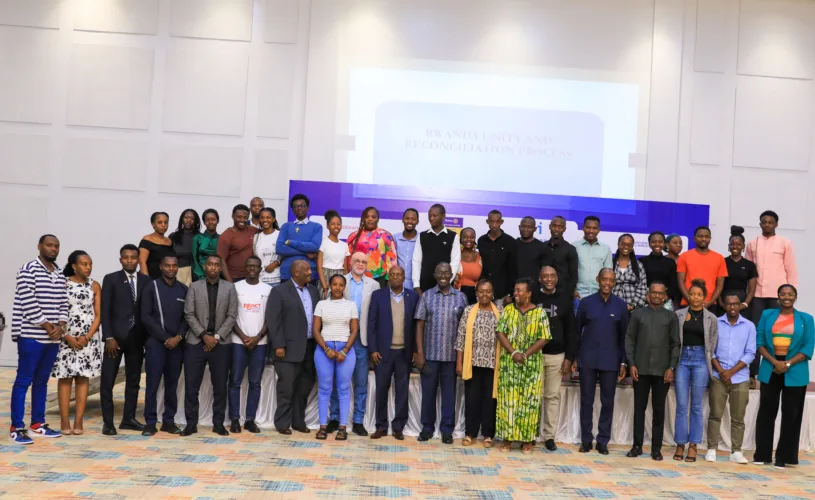
Frank Kayitare, Interpeace’s Country Representative, says empowering young people ensures lasting peace and social cohesion. “If you want to sustain peace and cohesion in Rwanda, you have to target young people. These discussions not only help them understand the past but also forge a mindset that is different from the one that led to the Genocide against the Tutsi. They also enable them to cultivate a mindset of dialogue, to solve any conflict through dialogue.”
Interpeace’s Work to Support Youth in Rwanda
Rwanda has made remarkable progress in strengthening social and economic resilience in the past 30 years. However, many Rwandans, including young people, face challenges related to the psychological wounds of the genocide and its aftermath, as well as economic development.
Interpeace uses community-based psychosocial support interventions such as Sociotherapy and Multifamily Therapy to create healing spaces for young people and their parents to discuss their past and embark on a mutual healing journey. It works with local partners such as Haguruka, Prison Fellowship Rwanda, and Dignity in Detention to organise intergenerational dialogues in the community.
Through a collaborative livelihood approach, Interpeace and its partners work to address socio-economic disparities and foster socio-economic resilience in youth by equipping them with financial and entrepreneurship skills. Young people are facilitated to learn how to develop bankable business projects and create and manage them. Through a competitive process, the most promising projects are supported with seed capital. Joint business initiatives play a dual role: enabling them to improve their social and economic conditions and sustain the social bonds they have formed during the healing journey.
Interpeace also works with youth-led organisations, such as Rwanda We Want, to strengthen their capacity and enable them to empower more youth across the country.
Interpeace is leveraging intergenerational dialogue to promote healing, understanding, and community-building in Burundi. The ‘Dukire Twubake’ (To Heal, To Build) programme is designed to address the impact of past trauma, gender and age on individuals and communities, with a particular focus on peacebuilding, development and decision-making. It exemplifies the effort to encourage open communication and foster mutual respect within communities.
This approach creates an environment where participants of all ages can openly share their experiences, thereby nurturing empathy, trust, and appreciation for diverse perspectives. By creating spaces for honest storytelling and attentive listening, the programme empowers Burundians to process their trauma, explore new avenues for progress, and gain deep insights into their own lives as well as the lives of others.
From 2023 to 2024, a series of intergenerational dialogues took place across Burundi, facilitated by the Centre d'alerte et de prévention des conflits (CENAP) and Interpeace under the Dukire Twubake programme, which is funded by the Government of Norway. These dialogues brought together individuals from different generations, providing adults who had experienced the country’s conflicts with an opportunity to share stories of "doing the right thing" in the face of adversity.
Before engaging in these dialogues, participants underwent a preparatory phase involving socio-therapy sessions. This process allowed them to address negative emotions, find healing, and challenge harmful stereotypes about other ethnic groups, paving the way for open and constructive intergenerational dialogues.
The first dialogue in 2023, held in Kabezi commune, saw participants sharing acts of humanity during times of violence in the country. Their testimonies, often involving acts of saving lives regardless of ethnicity, were met with warm applause from the youth in attendance. “The young participants appreciate the behavior adopted by these 'heroes' during moments of violent conflict, that of not giving in to violence, but of flying to the aid of other," observed one attendant.
Jean de Dieu, a member of the Dukire Twubake youth group, captured the impact of these dialogues, stating: "We have just understood that during these dark periods, Tutsis saved Hutus and vice versa. This helps build and strengthen confidence in the younger generation."
A second dialogue in 2023, held in Nyanza-lac commune, further amplified these messages, with participants sharing moving accounts of forgiveness and reconciliation across ethnic lines. One woman, who is now a local leader, recounted her harrowing experience of being wrongfully accused, imprisoned, and tortured. However, she later embraced her former accuser in a powerful act of forgiveness, drawing cheers from her neighbours.
As the dialogues continued into 2024, in Ruhororo communue, the focus shifted to the "heroes" or "pillars of peace" whose stories served as lessons for Burundi's youth. Emmanuel Barusasiyeko, a Hutu man, recounted how he sheltered three Tutsi children during the 1993 inter-ethnic massacres, risking his own life to guide them to safety. His actions were rewarded years later when one of the children, now living in Canada, sought to facilitate the migration of Barusasiyeko's son as a gesture of gratitude. Before concluding his narration, Barusasiyeko turned to the young people to tell them 'Ukora iciza ukagisanga imbere' (If you do good, you will reap the fruits in the future)."
These intergenerational dialogues not only fostered reconciliation but also provided a therapeutic outlet for participants. Christian, a Dukire Twubake beneficiary, explained: "They allow us to unburden ourselves because it is by talking about this difficult past and sometimes by trivialising it that we can finally live our present easily."
“Intergenerational dialogues are the final, hopeful step in our therapy sessions. We begin by addressing the negatives of the past in healing spaces. Then, we encourage members to share positive stories in these dialogues, fostering understanding and hope”, said the Programme Manager at CENAP, Serge Ntakirutimana.
“These dialogues, focusing on positive experiences, serve as a powerful tool to combat hatred and stereotypes, particularly in societies affected by conflict. Stories from both the elderly and the youth remind us that there is no ‘good’ or ‘bad’ ethnicity in places with a troubled history like Burundi. Every ethnicity has individuals who have demonstrated remarkable humanity and those who have been engulfed in violence. These shared stories stand as a testament to our shared humanity and a beacon of hope for a future that is more understanding and compassionate,” he added.
The Dukire Twubake programme recognises the transformative power of storytelling and listening in promoting healing and understanding. It encourages open communication, self-reflection, and the exploration of alternative paths forward, fostering a sense of community and collaboration. Using psychosocial recovery methods and capacity and confidence-building tools, the programme aims to empower women, youth, and communities affected by trauma. It helps them advocate for their needs, mobilise others around those needs, and lead initiatives that build social and political cohesion and improve livelihoods. A testament to this approach is the establishment of a savings and credit association in Kabezi commune by a group of twelve women in August 2023. This initiative not only addresses their need for affordable credit but also provides opportunities for mutual support and healing. Comprising women from different ethnic groups and religions, the association strengthens cohesion and reconciliation. This association was formed after the women benefited from the psychosocial support and capacity-building in entrepreneurship provided by the Dukire Twubake programme, thereby creating a continuous narrative of empowerment and healing.
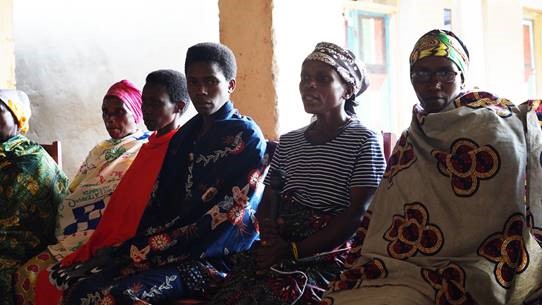
A participant from Ruhororo commune expressed astonishment, stating: "It's very impressive! I didn't know that the commune of Ruhororo has so many people who risked their lives to save neighbours in 1993. This is a very good example for us who have not lived through these events. Personally, I am determined to campaign for the good even during times of conflict."
As Burundi looks toward the future, the seeds of reconciliation sown through these intergenerational dialogues hold the promise of a more united and resilient nation. By honouring the stories of those who chose compassion over violence, the Dukire Twubake programme has inspired a new generation to embrace the values of humanity, forgiveness, and mutual understanding. These values will shape a more peaceful and prosperous future for Burundi.
Linking prisoners with those they offended – before their release - especially those who committed heinous crimes, like genocide or murder, should be an integral part of the prisoner rehabilitation and reintegration process. This facilitates a smoother and more effective reentry of prisoners into their families and community.
This step is relevant and a necessity in Rwanda, as approximately 20,000 prisoners convicted of genocide crimes perpetrated during the 1994 Genocide against the Tutsi, including masterminds, are expected to be released in the coming years. In addition, many genocide convicts have already been released, integrated into their communities, and live alongside Genocide survivors.
In March 2024, Interpeace, together with its local partners Dignity in Detention and the Rwanda Correctional Service (RCS), organised a unique event to reconnect 19 female prisoners detained in Nyamagabe Prison, Southern Province of Rwanda, with families of their victims and the broader community to seek forgiveness. The event took place in Nyamasheke District, Western Province, where they committed their crimes.
“I am standing before you today to ask for forgiveness for crimes I committed during the Genocide against the Tutsi in 1994. I killed my neighbours and friends. I acknowledge my crimes and humble myself before all of you, especially Genocide survivors,” implored Martha Mukamushinzimana, a 55 years old mother of five.
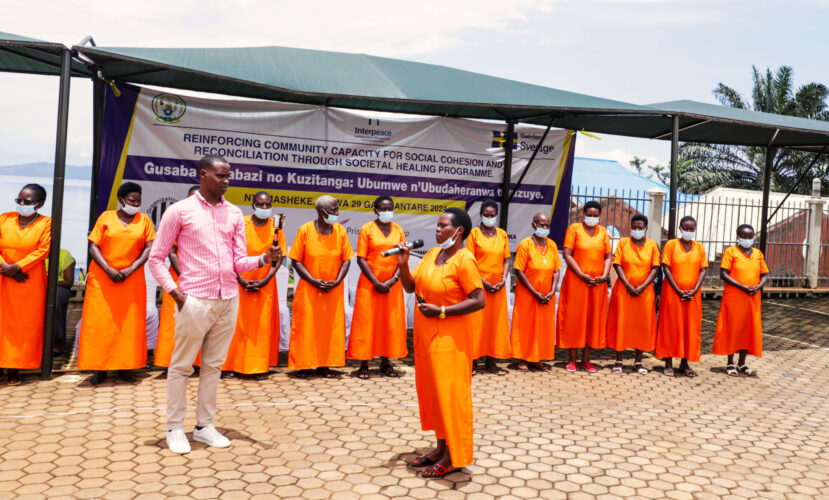
Mukamushinzimana participated in the killing of the Tutsi who sought refuge in the Nyamasheke Catholic Parish located in her neighbourhood and, in 2009, was sentenced to 15 years in jail by a Gacaca Traditional Court. Yet, her children didn’t know the reason for her imprisonment. “I have been a worse mother. I take this opportunity to apologise to my children. I behaved like a coward and felt ashamed to tell them the truth about my crimes,” said Mukamushinzimana who will be released in one month. She added, “I have been transformed; I am a new person now. I feel ready to come back and live in harmony with you and build our country together”.
One by one, the 19 women prisoners came forward to recount their crimes in front of genocide survivors, their own family members, local authorities, and other community members who came to witness. Their crimes ranged from killing the Tutsis, bringing stones used to kill, and luring victims to their homes under the guise of protection only to kill them. They took accountability for their actions and humbled themselves before community members.
Reconnecting prisoners with those they offended is part of Interpeace’s approach to psychological prisoner rehabilitation and reintegration, implemented in line with its Societal Healing programme in Rwanda. This programme fosters social cohesion and reconciliation and promotes psychological and economic resilience. Priority is given to those nearing release.
As Interpeace’s research studies have shown, during their incarceration, prisoners experience mental health distress resulting from the atrocities they committed and their life in prison, which constitute a stumbling block to their effective rehabilitation. The Societal Healing Programme established Sociotherapy healing spaces in prisons to provide inmates with psychosocial support care in a group setting. For three and a half months, weekly Sociotherapy sessions equip them with life skills to cope with their mental problems and take a new life orientation.
During the healing process, many voluntarily express their willingness to be reconciled with their victims’ families and the community. This is facilitated through reconciliation events, like the one in Nyamasheke, which was organised after thorough preparation of the concerned community members. Sociotherapy healing spaces play a catalytic role in shifting prisoners’ mindsets to become repentant individuals who accept responsibility for their acts and feel ready to live with others in society.
“Before attending a Sociotherpay healing space, I had no willingness to confess my crimes. I was convinced that I was innocent and falsely imprisoned. Sociotherapy enabled me to reflect on myself and my misdeeds. I realised I had killed my friends and neighbours and hurt their families and my community. From the bottom of my heart, I humbly ask Genocide Survivors for forgiveness,” confessed Agatha Nyirahabimana, 70 years old.
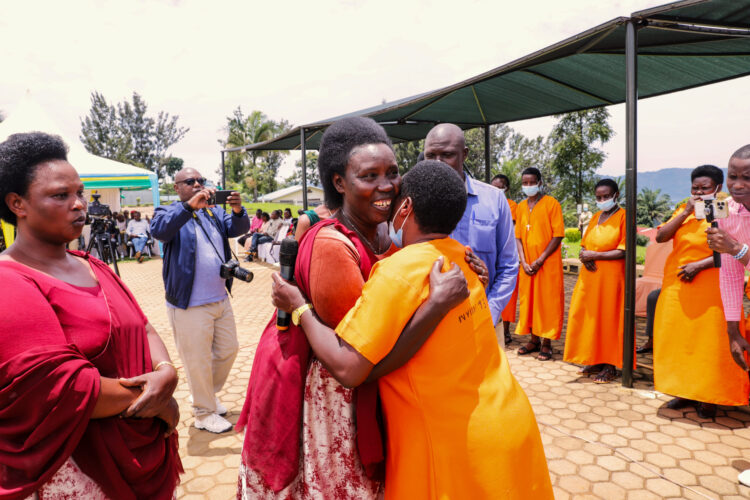
The families of the victims accepted their apologies without resentment. Saverina Utetiwabo, a Genocide survivor, forgave Mukamushinzimana. They had been close friends since childhood and were members of the Association des Eglises de Pentecote au Rwanda (ADEPR) church choir. However, Utetiwabo didn’t know her friend was a “genocidaire” who participated in the killing of her family members. “Learning about it was a total shock for me, and I immediately cut ties with her because I didn’t want to live with a criminal. Now that she has publicly confessed, I forgive her. I feel relieved and ready to renew our relationship,” she said.
Rwanda’s societal fabric is still fragile following the tremendous consequences of the genocide. Unprepared released prisoners are likely to cause tensions, trauma, and anxiety among families of genocide survivors and the community, posing a serious threat to reconciliation and resilience gains achieved. Providing prisoners nearing release with psychosocial support, coupled with community preparation, helps address these challenges and lays a solid foundation for a more reconciled, peaceful, and resilient society.
“In the past, we used to see genocide prisoners being released without our knowledge, and that caused fear and anxiety. We would call in panic authorities or security organs to alert them, as we thought released ‘genocidaire’ could kill us too. I am happy they came here to interact with us before their release,” said Utetiwamo.
Speaking at the event, the Executive Secretary of Western Province and the representative of Ibuka, an umbrella organisation of genocide survivors’ associations, commended the process's importance in truth-telling and fostering reconciliation and resilience.
As the United Nations prepares for its 2025 Peacebuilding Architecture Review (PABR), civil society actors have mobilised to ensure that their perspectives contribute to reshaping the UN’s peacebuilding efforts. These reviews serve a dual purpose: evaluating the UN’s past and present peacebuilding and peace-sustaining efforts and enhancing the effectiveness of the UN’s future initiatives. Two recent consultations held in Nairobi, Kenya provided insights towards this process.
In May 2024, Life & Peace Institute, Saferworld, and Interpeace hosted a dialogue to share perspectives on the current state of peace and security in the Horn of Africa. The dialogue assessed the UN's effectiveness and relevance in peacebuilding efforts, identifying challenges and areas for improvement. Key points raised in the dialogue included:
- The UN needs to reassess its role in supporting community-led peacebuilding, as it often struggles to engage with community actors.
- More direct, flexible, and long-term funding is needed for peacebuilding, with a focus on empowering and funding to communities.
- The UN's partnership with civil society needs rethinking, to address core needs and engage with communities.
Graeme Simpson, Principal Representative in New York, and Senior Peacebuilding Advisor at Interpeace, emphasised the importance of institutionalising civil societies voices in the international system, stating, “For too long, the multilateral system remains about only governments, but people don’t trust or cannot access their governments - we need to institutionalise civil society voices in the international system.”
Another participant stated, “What we want from the UN is genuine partnerships rooted in trust, we don’t want to be perceived as a tick in the box for them to fulfil a donor requirement.”
The ImPACT Coalition on Peacebuilding, convened on 10 May 2024 at the UN Civil Society Conference, was enriched by insights shared by variety of peacebuilders to ensure that the aspirations for peace are grounded in a peacebuilding architecture that is effective and adaptable to changing circumstances. The session focused on building the ImPACT Coalition as a tool to operationalise the aspirations of the Pact for the Future through the PBAR, and to ensure that the 2025 Peacebuilding Architecture is “fit for purpose”. The session brainstormed ways for civil society organisations to utilise the ImPACT Coalition effectively, including by identifying steps to strengthen partnerships for peacebuilding between the UN, civil society, and Member States.
Abdalla El-Saffi, Life & Peace Institute, Sudan Country manager emphasised the importance of recognising the UN's current legitimacy crisis and the need for reform in the peacebuilding vision. He highlighted the unique opportunity presented by the upcoming PBAR to address modern challenges such as climate change, migration, and digital risks. El-Saffi stressed the need for collaboration among multi-stakeholder, inclusive development, and grassroots impact for sustainable peace.
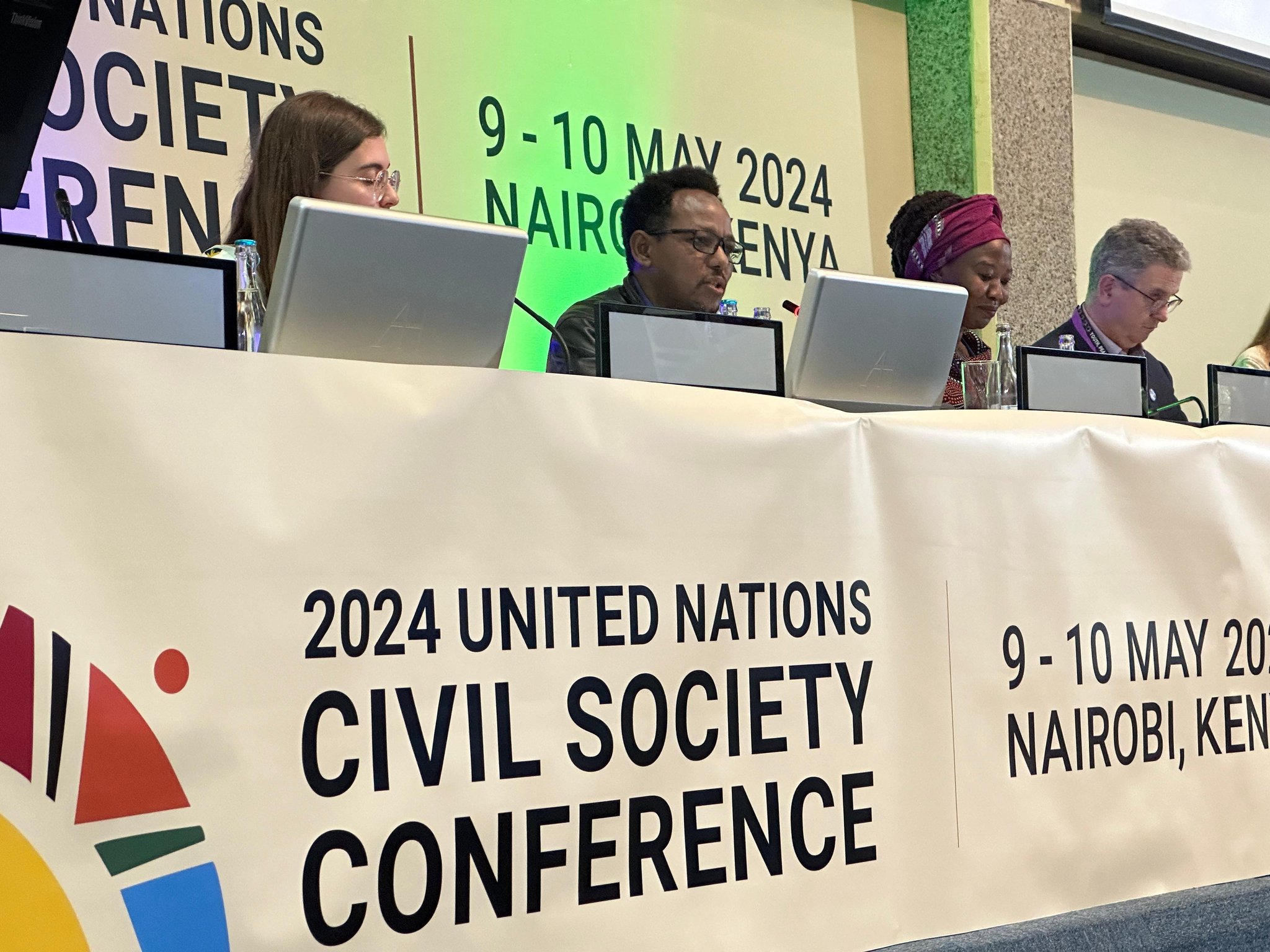
Ana Maria Bernal-Gaviria, representing Grupo Internacional de Paz (GIP), an NGO committed to social transformation for peacebuilding in Colombia, highlighted the CSO-UN Dialogue Initiative on Peacebuilding, and its goal to institutionalising civil society engagement in UN policy processes, such as the PBAR. Moreover, she pointed out the disconnect between the policy discussions happening in New York, and the peacebuilding work peacebuilders are doing on the ground, and thus the need to ensure that the upcoming PBAR is informed by, and reflective of, the work local peacebuilders are doing around the world.
Upholding the calls from civil society for sustained partnerships, localised funding and decision-making processes, and multi-stakeholder collaboration is essential in creating a peacebuilding architecture that is "fit for purpose" in addressing the complexities of 21st-century conflicts. Because, without policies grounded in people's experiences, implementation becomes challenging, if not impossible.
The Ministry of National Unity and Civic Engagement (MINUBUMWE), in collaboration with Interpeace has released new research titled: a Community-based Participatory Framework for the Assessment of Resilience in Rwanda. These findings were presented, along with insightful recommendations, during a stakeholder engagement event held on 8 March 2024 in Kigali, Rwanda.
The objective of this study, conducted across all 30 districts of Rwanda, was fourfold. Firstly, it aimed to formulate and validate resilience indicators for structuring future research activities, policies, and programmes related to community resilience in Rwanda. Secondly, it sought to devise a participatory, multi-level methodology for assessing resilience indicators, drawing from existing frameworks, while tailoring them to Rwanda's specific context. Additionally, the study aimed to establish a baseline for community resilience across all districts of Rwanda and to propose actionable policy and programmatic recommendations for enhancing resilience nationwide. Involving a significant sample of 7,481 individuals, the study adopted a mixed-methods approach, integrating both qualitative and quantitative methods. Resilience was evaluated across four levels—individual, household, community, and institutional—using a comprehensive set of 38 indicators.
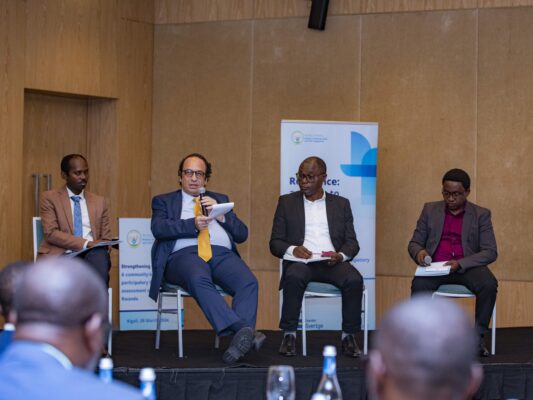
The findings underscored a commendable degree of resilience across all assessed levels, demonstrating a significant milestone three decades after the Genocide against the Tutsi. Recommendations emphasised the need for intensified efforts in societal healing initiatives, infrastructure development, and facilitating access to finance and employment opportunities.
During the stakeholder engagement event, Professor Francois Masabo, a lecturer and researcher at the University of Rwanda, lauded the study. He acknowledged its holistic approach and alignment with Rwanda's contextual realities.
The study received financial support from the Government of Sweden through its embassy in Rwanda. Martina Fors Mohlin, Counselor and Head of Development Cooperation at this embassy, reiterated Sweden's commitment to supporting the implementation of the developed framework within Rwandan communities. “We are proud to have taken part in this study by supporting Interpeace and also the ministry (MINUBUMWE) and enabling this conversation to take place. I very much look forward to working together to take those conclusions forward as we implement them in the society,” she noted.
The Community-based Participatory Framework for the Assessment of Resilience stands as a landmark initiative in Rwanda. It serves as a foundational reference point for future studies in the field of resilience within the country. Honorable Dr. Jean Damascene Bizimana, Minister of National Unity and Civic Engagement, underscored the timeliness of the research, noting Government of Rwanda’ s shift through MINUBUMWE, towards enhancing and strengthening the resilience of Rwandans amidst ongoing challenges stemming from the consequences of the Genocide agains the Tutsi.
“Resilience is one of Rwandan values. We want to design programmes and initiatives that are informed by our cultural values, which will help to effectively address our specific problems. This research that MINUBUMWE conducted jointly with Interpeace responds to this need. It will enable us to strengthen the resilience of Rwandans, to build a peaceful and prosperous country based on concrete and realistic indicators,” Hon. Bizimana highlighted.
As a way forward, a comprehensive roadmap is currently in development. This roadmap will guide the implementation of findings and recommendations derived from the research study. It serves as a strategic blueprint for all stakeholders involved in societal healing and resilience efforts. Each stakeholder will be tasked with setting specific strategic and programmatic objectives, along with corresponding targets and actions. These objectives aim to sustain the gains achieved in resilience while simultaneously addressing any fragilities identified during the research study.
In Côte d'Ivoire, the socio-political environment and democratic governance remain fragile in many localities, more than a decade after the 2010 post-electoral crisis that officially claimed more than three thousand lives. The population's low level of participation in the management of public affairs, coupled with persistent tensions surrounding the appointment of certain customary or political authorities, and a feeling of abandonment and mistrust towards certain government authorities, provide fertile ground for the political manipulation of latent conflicts and tensions within communities.
This risk is particularly acute during elections. On the occasion of the local elections (municipal and regional on October 13, 2018) and the presidential election on October 31, 2020, violent confrontations within the population took place. In some localities, in addition to these tensions, accusations of pressure, manipulation of the electoral process and falsification of results were made between supporters. These cycles of political and electoral violence are further exacerbated by the lack of support for local democratic governance mechanisms, which are often weakened.
In response to these threats to peace and cohesion, Indigo Côte d'Ivoire and Interpeace, with the technical support of their partner SeeD (Centre for Sustainable Peace and Democratic Development), carried out a consultation process and a survey called SCORE, to analyze the key determinants and levers for preventing political violence in the country.
One of the key messages to emerge from this research is that "a locality's vulnerability to political violence is illustrated by a context in which communities tend to withdraw into themselves and avoid integrating with others".
Such contexts can be identified by the uneasy nature of daily interactions between social groups (political, religious, ethnic) and the easy transition from "harmless" events (e.g. a soccer match or a car accident) to inter-group conflict. This dynamic weakens the social bonds between communities, predisposing them to violent confrontation.
In response to these findings, the “Cadre de Collaboration” (CdC - Collaboration Frameworks) have been set up. This collaborative governance engineering of conflict prevention and management initiatives at local level has produced satisfactory results, such as the absence of violence observed during the municipal, senatorial and regional elections in 2023, in the areas where the project was implemented.
In Béoumi (central Côte d'Ivoire), for example, the CDC was set up in a context of great mistrust between communities. However, thanks to their actions, the first members of the collaborative framework, essentially made up of influential members of a single community, managed to integrate members of other communities into the group. They achieved this by canvassing relevant and influential actors to facilitate the participation of other communities in community-building initiatives; the latter were subsequently invited to the various workshops and dialogue sessions with the CDC, which facilitated their adhesion. Thanks to this strategy, the framework has a heterogeneous and inter-community coloration and now carries out activities in the different neighborhoods of the locality.
Similarly, the town of Divo (in the south of the country), which was notorious for inter-community clashes at every election, whether local or national, was able to win the bet of "Zero violence" at the last poll.
"In Divo, our CDC is quite young, dating back to March 2023. But before that, the town of Divo was marked by a succession of post-electoral conflicts. And these conflicts have remained etched in the collective memory. As a result, violence peaked in August 2020 (presidential election), resulting in loss of life (...). There was a certain polarization between natives and non-natives. The CDC initiated a number of actions aimed at these people, who were heavily involved in the violence of 2020. There were talk-debates with women who were also actively involved in the conflicts, and also a meeting with young people. This helped us enormously, as this year's regional and municipal elections took place peacefully. The CDC met with the political candidates and staff, and they got involved in the peace process. They resolved to talk to their militants to ensure that this year's elections take place in good conditions, and that's what's been done", says the sub-prefect of Divo.
Several of the region's administrative authorities have expressed the wish to see a Collaborative Framework set up in their constituencies. And indeed, as the 2025 presidential election approaches, there seems to be a major need to scale up and strengthen these prevention structures and mechanisms within the areas most affected during previous electoral cycles, as expressed by the stakeholders. The aim is to prevent divisions between supporters of different political leaders turning into community conflicts in the long term.
As the Ivorian Minister for National Cohesion, Solidarity and the Fight against Poverty, LOGBOH Myss Belmonde DOGO, put it at the close of the project: "As the project draws to a close, and with the 2025 elections looming, anticipation must be the watchword. We need to step up the pace so that we don't just act on the eve of the elections and reap positive results. That's why I'm inviting Interpeace, Indigo, SeeD and others to join us in building the future. (...) It's important to be able to extend this collaborative, citizen-based governance engineering beyond the localities that have already benefited, because the results show that this is an approach that can really help reduce violence and conflict in a sustainable way, and above all through the commitment and ownership of everyone", she asserted.
The head of the European Union delegation to Côte d'Ivoire, Ambassador Francesca Di Mauro, agrees: "We are all looking ahead to the upcoming elections, particularly the presidential elections, which are generating a great deal of excitement and therefore potentially present risks. This general context arouses our attention and challenges us all to consider our responsibility and our role in ensuring that the democratic game and the animation of political life are not opportunities for violence, but rather moments of dialogue to build a harmonious and peaceful society".
In line with these orientations, one of the main recommendations of this survey is the short-term implementation of a barometric tool enabling an early warning and response system based on the results of the SCORE analysis, going hand in hand with the scaling-up of collaborative frameworks throughout Côte d'Ivoire.
Access all SCORE survey results here and the summary report of analyses and recommendations here.





